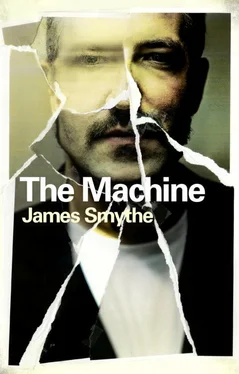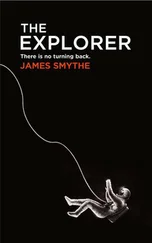She lies back on the sofa, to block out the noise of the turbine in the Machine’s room, and the vibrations, and the sudden pain in her head.
What would I like to forget? Vic asks. His voice fills the flat, loud and clear. Like he’s actually there, played back by the Machine on the highest volume it can muster. This is from later on in his treatments. When it started, it took forever: like it was massaging his memories to find the knot. One by one, they came. I’d like to forget what I did after I got back. How I treated Beth.
Didn’t they medicate you? the doctor asks.
They gave me opioids. Do you know what they do to a person? How much they rob of you? I couldn’t take them after the first few.
Maybe they could have helped.
No. No. I was responsible for what I did. His voice degrades into tears, and that’s the sound that comes over the Machine’s thrum: her husband sobbing. I want to tell her that I’m sorry, he says through the tears.
Beth stands up and walks to the doorway of the Machine’s room. She doesn’t go in: she stands against the connecting wall instead. She leans against it. She cradles a full glass of whisky, raising to her lips every so often and sipping. Letting it sting her lips where the heat of the days has made them crack very slightly.
So what would you like to forget? the doctor asks.
That. I’d forget that I hurt her. I’d forget that I did this, and that I was – that I am – the man I am now. I don’t recognize myself when I’m like that. I’d get rid of that.
Don’t, Beth says.
I would get rid of everything that made me that man.
Don’t.
Do you know what we’re doing here, Victor?
You’re helping to make me better. That’s what I know.
Why you’re wearing that Crown? Why we’re talking like this?
Something. He pauses, unsure of himself. Beth can hear it in his voice. She knows every nuance. You’re taking away memories, is that right?
That’s right, the doctor says. Beth can see him now, pressing the PURGE button on the Machine’s hulking screen: flushing everything that had been said before away. She rounds the corner and goes into the room, and there’s the Machine. She doesn’t know how it’s playing this for itself. (There was a part of her that expected to see Vic and the doctor, sitting here, playing this out for real: that’s how fake this all feels to her, like an accident or a lie, or a dream.)
How dare you? she asks. She puts her hands on the metal, which is so cold, and the shaking, which roars along her bones. Into every part of her. Come on, she says. The screen isn’t showing anything. That same painted blackness. Come on. She hits it, a punch with the flat of her fist. Play me more of him. Tell me more about what he felt.
It obliges.
What are we doing? Vic asks, another file starting. Must be the next one, chronologically. I’m so sorry, what are we doing?
Not the doctor’s voice, next. Beth’s. We’re trying something, she says.
It’s not time for a treatment, he tells her. I didn’t mean it, please don’t punish me.
I won’t. This isn’t punishment.
There are rules, Vic’s voice says. I remember that they told us.
No, Beth now says, listening to it. Not this one.
The Beth in the recording is persuasive. She sounds so strong and confident. The rules are for your safety, she says, and we won’t break them. But they told me to help you with your treatments, didn’t they?
Yes. He’s so docile.
Don’t play this, now-Beth pleads. She presses the Machine’s screen but she can’t get it to wake from its sleep. Please, she begs.
What happened earlier today? then-Beth asks. She’s wiping something. Erasing something beyond his normal treatments. Do you remember?
I didn’t mean to, Vic says.
I didn’t ask that. I asked what happened.
We had a fight, he says. Oh my God, I’m so sorry, I’m so sorry.
That’s okay. You’re not yourself. I have to press this, then-Beth says. Now-Beth sees it happening: COMMIT depressed. Ready. Primed. What did we fight about? then-Beth asks.
I had a dream.
What about?
I was fighting. Some sort of fight. I had a gun. I was, uh. Something exploded. I was there, and then… I don’t know, I don’t know.
Shh. Tell me everything you can remember.
There was an explosion and my head was on fire, like burning, with the pain. And I had to shoot somebody or I would have been dead. I remember that.
Where were you?
Somewhere hot. Not here, though. Hot like the desert, somewhere like that. It was so hot. Went right through my helmet. I had a helmet on. Then I woke up, and you were there, and I didn’t mean it, but I was so confused.
What did you do then?
Now-Beth can hear it in then-Beth’s voice: the slight tweak of her jaw, which would soon start to swell, although she wasn’t even aware that it had been fractured. I don’t need to hear this again, now-Beth says. Turn it off. Vic’s voice speaks through her, above her. She hits the screen again, so hard that it should break, she thinks, but it doesn’t, and then she scrabbles to the floor and to the plug. She pulls it from the wall but the Machine continues to whirr. The turbines keep spinning. The voices are gone, but the screen is still on. Backup batteries, in case of power cut. The only way to shut it down now would be to destroy it, to open it up and cut its cords. She doesn’t.
She takes the Crown down from the dock and puts it onto her head. Perfect fit, always is.
Is this what you want? she asks it. Do you want more of me?
She doesn’t press the buttons. She lies down with the Crown on, and she thinks, as the room spins and she feels herself sleeping, so quickly, so exhausted and shocked and terrified, that it will do what it will to her. And it can’t do anything that will change her mind about this.
Tomorrow, she will get Vic from the clinic. Tomorrow she’ll bring Vic home.
The problem with memory was that it told us whatever we wanted to hear. It had no shape of its own.
David Vann,
Dirt
In through the front door he falls, because Beth can’t prop him up and work the key and keep herself steady, and when she feels herself going she drops him. Better that he take the soft landing than she fall with him, and she bear the brunt, break something. That would ruin everything. He’s taken worse in his time. And, she reminds herself, this him is just a form. A shell.
He lands softly, his skin making the only noise on the flooring. Nothing from his mouth. The lift was broken – the lift is always broken – so his wheelchair is still down at the bollards, waiting to be folded and lugged upstairs. She won’t need it. Vic’s not so gone that he can’t be coerced into walking when he needs to, or into supporting some weight on feet which almost seem to drag their toes along the floor with each step. Still, in case. Maybe, she thinks, the muscles will have atrophied a little, and maybe he couldn’t sustain this over any great distance. You read about that; it would drive him mad. She would hate to have him back and then have to do years of physiotherapy. Still, she reasons, that would be better than nothing. She pulls him inside the flat, manoeuvring him onto his back. She leaves him there while she runs to the stairs, down, to where she left the chair. It’s already gone. Some of the residents are like magpies. Finders keepers, if anything is left for more than a minute. She stands there and looks around, to see if any curtains twitch. She would go to the door and hammer on it and demand her property back, if she could work out where it had gone – but she’s completely alone. Not a peep.
Читать дальше
Конец ознакомительного отрывка
Купить книгу










